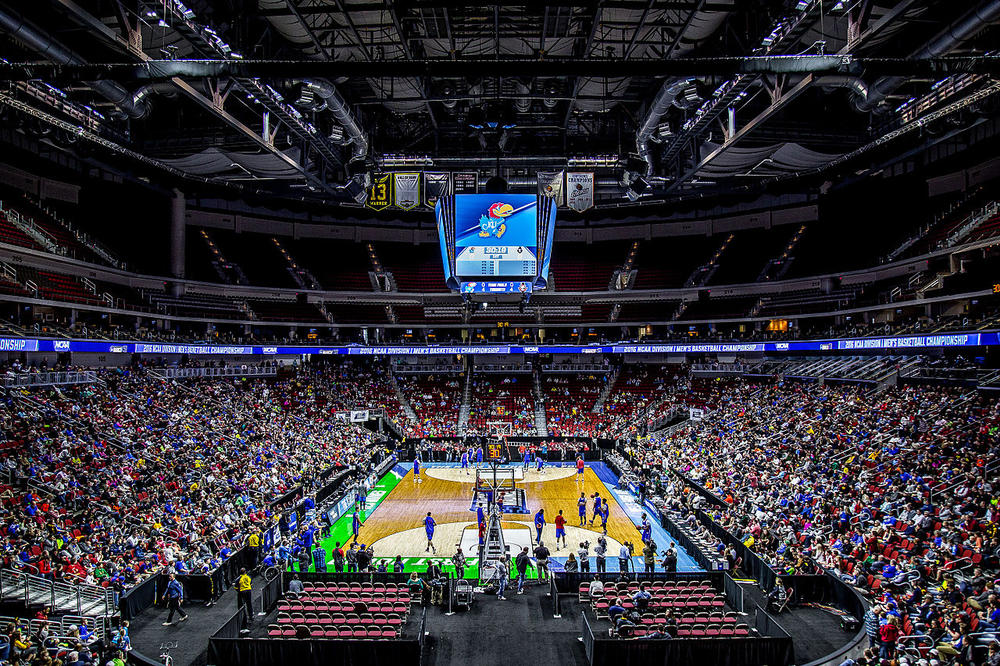Section Branding
Header Content
NCAA Will Play In Arenas Without Fans
Primary Content
UPDATE 5 p.m.: The NCAA announced Wednesday that men's and women's basketball tournaments will be played in arenas without fans due to the coronavirus crisis.
That includes the Final Four scheduled April 4 through 6 at Mercedes-Benz Stadium in Atlanta.
"The NCAA continues to assess the impact of COVID-19 in consultation with public health officials and our COVID-19 advisory panel," NCAA president Mark Emmert said in a statement.
"Based on their advice and my discussions with the NCAA Board of Governors, I have made the decision to conduct our upcoming championship events, including the Division I men's and women's basketball tournaments, with only essential staff and limited family attendance.
"While I understand how disappointing this is for all fans of our sports, my decision is based on the current understanding of how COVID-19 is progressing in the United States. This decision is in the best interest of public health, including that of coaches, administrators, fans and, most importantly, our student-athletes. We recognize the opportunity to compete in an NCAA national championship is an experience of a lifetime for the students and their families. Today, we will move forward and conduct championships consistent with the current information and will continue to monitor and make adjustments as needed."
ORIGINAL STORY: As Atlanta prepares to host the Final Four of the NCAA Men’s Basketball Tournament, the fate of March Madness amidst the spread of the coronavirus is still up in the air.
On Tuesday evening, the NCAA released a statement on the situation:
“The NCAA continues to assess how COVID-19 impacts the conduct of our tournaments and events. We are consulting with public health officials and our COVID-19 advisory panel, who are leading experts in epidemiology and public health, and will make decisions in the coming days.”
The National College Athletic Association’s latest statement is slightly more measured when compared to its stance earlier in the day.
“Neither the NCAA COVID-19 advisory panel, made up of leading public health and infectious disease experts in America, nor the CDC or local health officials have advised against holding sporting events,” the earlier statement read.
“In the event circumstances change, we will make decisions accordingly.”
https://www.youtube.com/watch?time_continue=25&v=BLDb8sK95PE
Before the NCAA issues a decision on whether the 68-school tournament will take place, several conferences and schools have already taken preemptive action.
The Ivy League decided to cancel the upcoming Men’s and Women’s Basketball Tournaments, which usually decides which teams will automatically qualify for March Madness.
The league’s regular-season champions, Princeton’s women and Yale’s men, will receive the automatic bids this year, a decision that has led to a protest petition from student-athletes.
As for the Big West and Mid-American Conference (MAC), their tournaments will be played without fans in attendance.
Official statement regarding upcoming MAC Men's and Women's Basketball Tournament pic.twitter.com/reCRnnd0ML— #MACtion (@MACSports) March 10, 2020
And other major conferences, including the Big 12, ACC, Big East and SEC, will not allow media in the locker rooms during their conference tournaments.
Earlier this month, the NCAA formed an advisory panel made up of health experts to guide its response to the outbreak of the coronavirus
Two doctors from Emory University in Atlanta were named to the panel: Colleen Kraft and Carlos Del Rio.
"We know that this a dynamic and evolving situation," Kraft said during a recent interview with GPB. "And it is concerning when you hear different information everyday."
Basic safety measures are already being planned, such as limiting the amount of physical contact between players, fans and media, as well as sanitary precautions for players.
But the biggest decisions, such as playing games with no fans in attendance or cancelling match-ups outright, have yet to be made.
Ohio Gov. Mike DeWine, who declared a state of emergency this week, is pushing the NCAA to ban spectators for games in Dayton and Cleveland, which are set to host first and second round match-ups in the tournament.
ATHLETICS: For indoor events, we are asking for no events with spectators other than the athletes, parents, and others essential to the game.
Right now, outdoor events can continue. #COVID19— Governor Mike DeWine (@GovMikeDeWine) March 10, 2020
Selection Sunday is set to take place this weekend, when the full bracket for the Division I tournament will be released.
After the schools are selected, games will take place in Dayton, Albany, St. Louis, Spokane, Tampa, Cleveland, Greensboro, Omaha, Sacramento, Indianapolis, Los Angeles, Houston and New York, with the Final Four taking place in Atlanta.
Georgia currently has six confirmed cases of COVID-19 and a number of other people are awaiting final test results from the Centers for Disease Control and Prevention.


